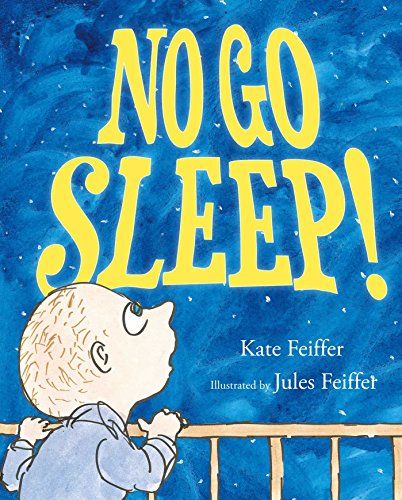-
I'm Not Bobby
Jules Feiffer
Hardcover (Hyperion Book CH, Sept. 2, 2001)Feiffer, Jules G
G
-
A Barrel Of Laughs, A Vale Of Tears
Jules Feiffer
School & Library Binding (Turtleback Books, March 7, 1998)FOR USE IN SCHOOLS AND LIBRARIES ONLY. Prince Roger is sent on a quest, the purpose of which is to turn the carefree young prince into a sober man and worthy monarch, but Roger gets everything wrong--except for the meaning of life, and that he gets right. R
R
-
I Lost My Bear
Jules Feiffer
Paperback (Scholastic Inc, Jan. 1, 1999)children L
L
-
No Go Sleep!
Kate Feiffer, Jules Feiffer
eBook (Simon & Schuster/Paula Wiseman Books, June 12, 2012)A baby—finally—falls asleep with the rest of the world in this soothing picture book with audio from Kate and Jules Feiffer.And the sun said,“I’ve gone for the day.When you wake up,I’ll be back to play.”Even though the stars are out and the moon is bright, the baby says, “No, go, sleep!” But as the world around the baby gradually goes to sleep—first the sun, then the moon, then the sheep, tree, and owl—the baby finally, finally, finally falls asleep too. Lyrically written, this lulling text, paired with soothing art and including audio accompaniment, will put even the youngest reader in the mood to visit dreamland. J
J
-
Meanwhile
Jules Feiffer
HardcoverNone
-
Bark, George
Jules Feiffer
Paperback (Laura Geringer, Aug. 16, 1999)None H
H
-
Bark, George
Jules Feiffer
Paperback (Picture Lions, Aug. 16, 2001)None H
H
-
Meanwhile
Jules Feiffer
Paperback (HarperCollins Publishers, March 15, 1997)Jules Ralph Feiffer (b. 1929)is an American syndicated cartoonist, most notable for his long-run comic strip titled Feiffer. He has created more than 35 books, plays and screenplays. In 1986, he won the Pulitzer Prize for his editorial cartooning in The Village Voice.At age 16, Feiffer began as an assistant to writer-artist Eisner, whose comic strip The Spirit appeared in a seven-page insert in Sunday newspaper comics sections. As Eisner recalled in 1978: Feiffer walked in and asked me for a job and said he'd work at any price, which immediately attracted me. He began working as just a studio man - he would do erasing, cleanup... Gradually it became very clear that he could write better than he could draw and preferred it, indeed - so he wound up doing balloons . First he was doing balloons based on stories that I'd create. I would start a story off and say, 'Now here I want the Spirit to do the following things - you do the balloons, Jules.' Gradually, he would take over and do stories entirely on his own, generally based on ideas we'd talked about. I'd come in generally with the first page, then he would pick it up and carry it from there. Before this, in 1947, when Feiffer asked for a raise, Eisner instead gave him his own page in The Spirit section, where the 18-year-old Feiffer wrote and drew his first comic strip, Clifford (1949-51), published in six newspapers. Feiffer's strips ran for 42 years in The Village Voice, first under the title Sick Sick Sick, briefly as Feiffer's Fables and finally as simply Feiffer. Initially influenced by UPA and William Steig, the strip debuted October 24, 1956, and 14 months later, Feiffer had a bestseller when McGraw-Hill collected the Village Voice strips as Sick Sick Sick: A Guide to Non-Confident Living. Beginning 1959, Feiffer was distributed nationally. His strips, cartoons and illustrations have appeared in The L A Times, New Yorker, Esquire, Playboy and The Nation.
-
A Room with a Zoo 1st Edition
jules feiffer
Hardcover (hyperion, March 15, 2005)Gift quality. No remainder marks. Same day shipping.
-
I Lost My Bear
Jules Feiffer
School & Library Binding (Turtleback Books, Aug. 8, 2000)FOR USE IN SCHOOLS AND LIBRARIES ONLY. When she cannot find her favorite stuffed toy, a young girl asks her mother, father, and older sister for help. L
L
-
Meanwhile...
Jules Feiffer
Hardcover (Harper Collins, March 15, 1999)None
-
THE MAN IN THE CEILING
Jules Feiffer
Hardcover (Harper Collins, Jan. 1, 1993)None T
T